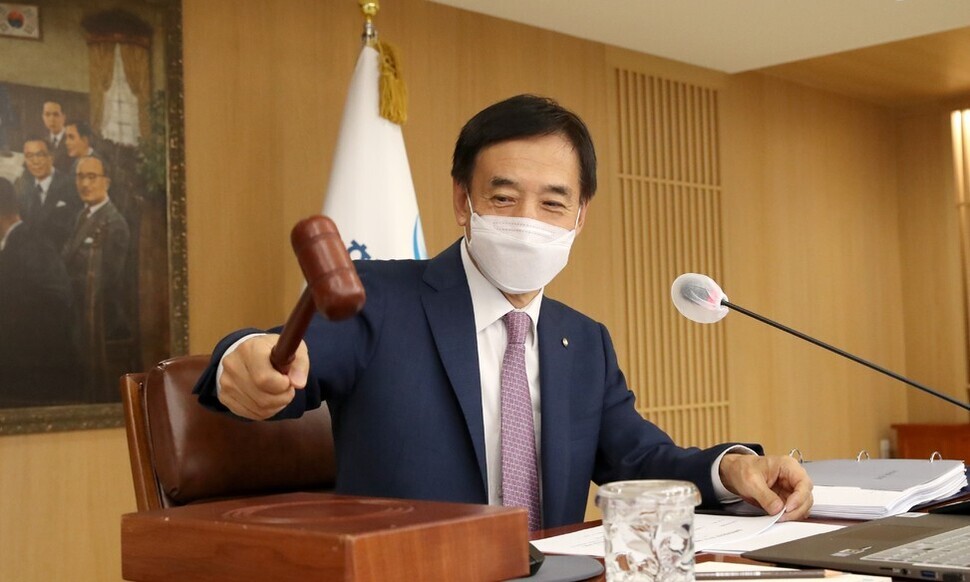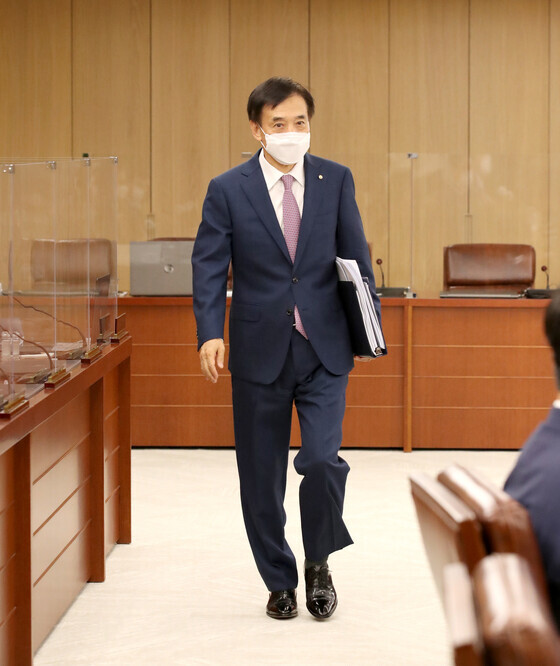hankyoreh
Links to other country sites 다른 나라 사이트 링크
Bank of Korea raises benchmark rate to manage debt risk

The Bank of Korea (BOK) announced the end of the era of historically low interest rates on Thursday. It raised the base rate of interest 0.25 points and hinted at more rate hikes to come.
The BOK believes that the base rate, which it adjusted to a record low of 0.5% in May 2020 in response to the COVID-19 pandemic, has helped bring about an economic recovery. With the economy back on track, the BOK believes, it should be able to withstand further waves of COVID-19.
Therefore, the BOK said, it will now take steps to counteract the side effects of the ultra-low interest rates. This was a warning that the bank will no longer disregard risky profit-seeking behavior that uses low interest rates as leverage.
Why raise interest rates during the pandemic?The BOK offered three main reasons for raising interest rates on Thursday: the economy’s steady recovery despite the latest wave of COVID-19, inflationary pressure, and accumulated financial imbalance. The chief priority behind the BOK’s rate hike is financial stability.
One major debate at the BOK’s monetary policy board has been whether to prioritize financial stability or the real economy. While the economy and the price of goods are clearly rising from last year, they’re not overheated enough to mandate higher interest rates. Korea has also been battling an unexpected fourth wave of COVID-19 since July.
After much deliberation, the BOK decided to prioritize financial stability.
“By lowering interest rates, which makes it less expensive for economic actors to borrow money, we prevented economic activity from contracting. But as these unusually relaxed conditions have continued for a year and a half, we’re starting to see side effects. Going forward, we need to normalize interest rate policy in line with the improving economy,” BOK Governor Lee Ju-yeol said.
The BOK’s decision is grounded in confidence about the real economy. The bank believes the economy has recovered enough to withstand the shock of an interest rate hike.
While the BOK had been worried about the ramifications of the fourth wave of COVID-19, it believes the impact on consumer sentiment has been milder than expected.
Domestic demand continued to recover last month, with credit card charges rising 7% year on year to 14.52 trillion won (US$12.38 billion).
Given the learning curve effect for economic actors, the boom in exports, the expanded vaccine rollout, and the approval of a revised supplementary budget, the BOK thinks Korea will hit its yearly target of 4% growth.

Despite the BOK’s prediction, the prevailing view in the market is that the interest rate hike won’t immediately curb household debt or the white-hot real estate market. The problem is that low interest rates are just one of several factors behind ballooning debt and soaring housing prices.
The BOK itself appears to acknowledge that raising interest rates will be limited in its effect.
“What we’re calling financial imbalance obviously can’t be resolved through this one measure, and housing prices are the result of the interaction of several factors, and not just low interest rates,” Lee said.
What the BOK is hoping for is a change in sentiment among economic actors. The sense that interest rates may keep rising could curb the excesses of debt-financed profit-seeking, the bank says. That could also enable other regulations on the financial and real estate markets to have their intended effect.
“Even if interest rates are hiked, economic actors will still expect asset prices to rise, and concerns about the situation in the housing market will impact demand for loans,” Lee said.
“Interest rates by themselves don’t determine everything, but they’ll definitely have the effect of restricting demand for such loans.”
The BOK is expected to pursue further rate hikes in a bid to cool the market. Two more hikes would be needed to return the base rate to its pre-pandemic level of 1.25%.
By Jun Seul-gi, staff reporter
Please direct comments or questions to [english@hani.co.kr]

Editorial・opinion
![[Column] Has Korea, too, crossed the Rubicon on China? [Column] Has Korea, too, crossed the Rubicon on China?](https://flexible.img.hani.co.kr/flexible/normal/500/300/imgdb/original/2024/0419/9317135153409185.jpg) [Column] Has Korea, too, crossed the Rubicon on China?
[Column] Has Korea, too, crossed the Rubicon on China?![[Correspondent’s column] In Japan’s alliance with US, echoes of its past alliances with UK [Correspondent’s column] In Japan’s alliance with US, echoes of its past alliances with UK](https://flexible.img.hani.co.kr/flexible/normal/500/300/imgdb/original/2024/0419/2317135166563519.jpg) [Correspondent’s column] In Japan’s alliance with US, echoes of its past alliances with UK
[Correspondent’s column] In Japan’s alliance with US, echoes of its past alliances with UK- [Editorial] Does Yoon think the Korean public is wrong?
- [Editorial] As it bolsters its alliance with US, Japan must be accountable for past
- [Guest essay] Amending the Constitution is Yoon’s key to leaving office in public’s good graces
- [Editorial] 10 years on, lessons of Sewol tragedy must never be forgotten
- [Column] A death blow to Korea’s prosecutor politics
- [Correspondent’s column] The US and the end of Japanese pacifism
- [Guest essay] How Korea turned its trainee doctors into monsters
- [Guest essay] As someone who helped forge Seoul-Moscow ties, their status today troubles me
Most viewed articles
- 1[Column] The clock is ticking for Korea’s first lady
- 2Hong Se-hwa, voice for tolerance whose memoir of exile touched a chord, dies at 76
- 3[Column] Has Korea, too, crossed the Rubicon on China?
- 4After 2 months of delayed, denied medical care, Koreans worry worst may be yet to come
- 5[Correspondent’s column] In Japan’s alliance with US, echoes of its past alliances with UK
- 6US overtakes China as Korea’s top export market, prompting trade sanction jitters
- 7All eyes on Xiaomi after it pulls off EV that Apple couldn’t
- 8[Photo] Smile ambassador, you’re on camera
- 9Samsung barricades office as unionized workers strike for better conditions
- 10S. Korea “monitoring developments” after report of secret Chinese police station in Seoul